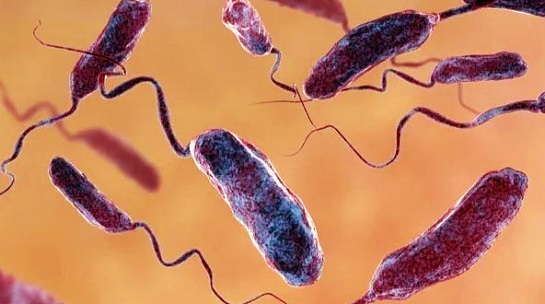Nikhil Prasad Fact checked by:Thailand Medical News Team Aug 04, 2024 7 months, 4 weeks, 11 hours, 31 minutes ago
Medical News: The New Face of an Ancient Disease
Cholera, a waterborne disease caused by the bacterium Vibrio cholerae, has plagued humanity for centuries, with pandemics causing massive mortality and societal disruption. The recent resurgence of cholera, combined with new research, highlights the evolving dynamics of this disease in the context of global climate change. This
Medical News report explores how strain variations and climate anomalies are synergistically influencing cholera pandemics, with a particular focus on historical patterns and future projections.
 Global warming is creating opportunities for deadly strains of cholera
The Historical Context: Cholera Pandemics from the 19th to the 21st Century
Global warming is creating opportunities for deadly strains of cholera
The Historical Context: Cholera Pandemics from the 19th to the 21st Century
Cholera pandemics have been a recurring nightmare since the early 19th century. The 6th pandemic (1899-1923) and the 7th pandemic (1961-present) have been particularly devastating. The 6th pandemic, which caused over 700,000 deaths in British India alone in 1900, was characterized by the spread of the Classical strain of Vibrio cholerae. The 7th pandemic saw the emergence of the El Tor strain, which has since become the dominant strain globally.
Climate Anomalies and Cholera Outbreaks
The Role of El Niño and La Niña
The El Niño Southern Oscillation (ENSO) significantly impacts global weather patterns, including temperature and rainfall, which in turn affect the prevalence and spread of cholera. Historical data from the 6th cholera pandemic reveal a striking synchronization of cholera outbreaks in Bengal during the El Niño event of 1904-07. These anomalous weather conditions facilitated the spread of cholera across regions, highlighting the complex interplay between climate and disease dynamics.
Case Study: Bengal During the 6th Pandemic
In Bengal, the 6th pandemic's cholera outbreaks were synchronized across vast regions, particularly during the El Niño event of 1904-07. This synchronization, coupled with anomalous rainfall and temperature patterns, created ideal conditions for cholera transmission. The delayed and intensified monsoon rains, followed by a colder-than-normal winter, disrupted usual cholera seasonality, resulting in a single, exceptionally large annual peak in cholera cases.
Strain Variations: Evolutionary Changes and Their Impact
The Rise of the El Tor Strain
The transition from the Classical strain to the El Tor strain marked a significant shift in cholera epidemiology. The El Tor strain, first identified in the 1960s, gradually replaced the Classical strain due to its enhanced survival in the environment and higher transmission rates. This strain replacement was not instantaneous but occurred over several years, indicating a complex interplay between environmental factors and pathogen evolution.
The O139 Strain: A Short-Lived Threat
The emergence o
f the O139 strain in the 1990s briefly raised concerns about a new cholera pandemic. However, this strain failed to establish itself long-term, largely due to competitive exclusion by the El Tor strain. Nevertheless, the temporary rise of O139 underscores the potential for new strains to emerge and the critical role of environmental conditions in their proliferation.
Future Projections: Climate Change and Cholera Dynamics
Global warming is expected to increase the frequency and intensity of climate extremes, including those associated with ENSO. Climate models predict more frequent and severe El Niño and La Niña events, which are closely linked to cholera outbreaks. For instance, the CMIP6 climate models project a higher probability of extreme precipitation events in regions like Bangladesh, creating more opportunities for cholera transmission.
Implications for Public Health
The synergy between strain variation and climate anomalies suggests that future cholera outbreaks may become more severe and widespread. Public health strategies must adapt to these changing dynamics, emphasizing the need for improved water and sanitation infrastructure, enhanced surveillance, and climate-resilient health systems.
Conclusion: A Call for Vigilance and Adaptation
The historical analysis of cholera pandemics and future climate projections indicate a concerning trend: increased climate variability and extremes under global warming provide windows of opportunity for emerging pathogens. Understanding the role of climate anomalies in cholera dynamics is crucial for developing effective public health strategies. As climate change continues to reshape our world, the battle against cholera and other infectious diseases must adapt to these new realities.
The study findings by researchers from Spain, United States of America and Germany were published in the peer reviewed journal: PLOS Neglected Tropical Diseases
https://journals.plos.org/plosntds/article?id=10.1371/journal.pntd.0012275
For the latest updates on cholera research and public health strategies, check Thailand
Medical News and stay informed about emerging threats and preventive measures.
Read Also:
https://www.thailandmedical.news/news/breaking-oropouche-virus-makes-a-resurgence-22-cases-in-bolivia-possibly-behind-rise-in-unexplained-fevers-and-platelet-dips-in-india
https://www.thailandmedical.news/news/central-and-south-america-facing-an-oropouche-fever-outbreak
